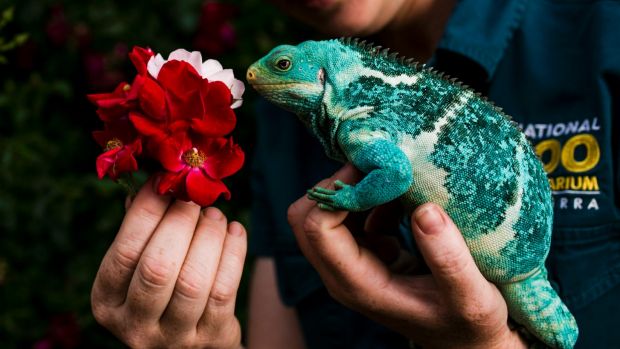An overgrown pile of paperwork is the welcome back to work that most Canberrans look forward to after the summer holidays.
For Renee Osterloh it is an excited singing capuchin monkey spraying urine on her neck and arms to re-mark its territory.

When most people are drinking a second coffee, Ms Osterloh the operations manager at Canberra's National Zoo and Aquarium, is feeding wild animals and giving giraffes daily pedicures as part of the zoo's training and conditioning program.
Diving into a fish tank full of the wonders of the Great Barrier Reef was all it took to open Ms Osterloh's eyes to the wild world of zookeeping at Canberra's National Zoo and Aquarium.

In 2007 casually cleaning the aquarium exhibits helped her to pay her way through an industrial design degree at the University of Canberra.
Ms Osterloh was also given an opportunity to redesign the overall layout and aesthetics of the aquarium.
This led to her being part of the zoo's expansion project, something she's worked on for the past 10 years.
"While I was cleaning exhibits I started to revamp as I did it, I was very hands-on and practical and visual with what I proposed as concepts and ideas," Ms Osterloh said.

"I was in the tank drilling holes, placing and gluing the coral into the exhibits. It wasn't just the concepts it was delivering the design product as well, and that really built the owner's trust."
She also added to her dive master qualification with a Certificate III in Captive Animals, which enabled her to become a qualified zookeeper.

"It's definitely an around-the-clock job so not only are you working here throughout the day but you're also going home and taking care of these animals at home," Ms Osterloh said.
When a one-week old ring-tailed lemur's mother was unable to produce milk, she stepped in as a keeper and brought baby Makai home every day after work to feed him every two hours throughout the night.

"It's definitely hard not to see these guys as a close family member, you do build up an emotional attachment," she said. "It's just like any pet at home."
Interactions, communicating and building the animal's trust, along with continuous education of each species is a vital aspect of working in the zoo industry.
In 2013 Ms Osterloh went to Fiji to get more hands on experience with one of the zoo's ambassador species, the Fijian crested iguana.
"It's really quite important to understand the habitats which they're from, as well as how they're kept in different environments, like zoo environments, and bringing that experience back to the Fijians here at the National Zoo and Aquarium," she said.
Ms Osterloh said anyone aspiring to work in a zoo should get experience by volunteering.
'If you're passionate about animals and about aquatic species or reptiles then getting hands on experience is the most important aspect," she said.